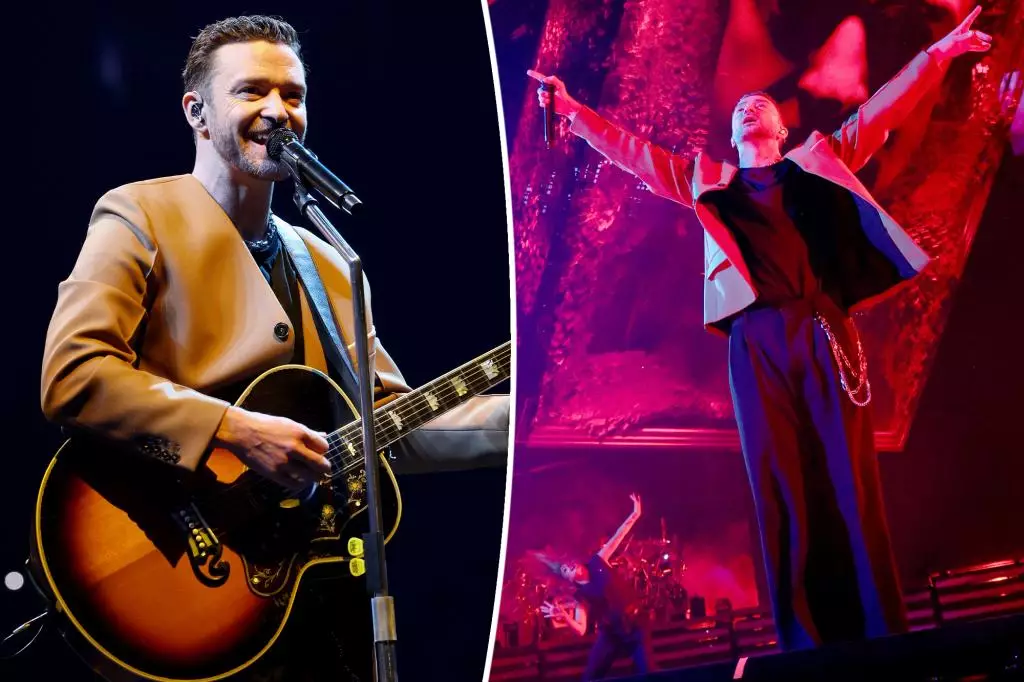In recent days, fans of pop sensation Justin Timberlake have expressed their discontent following the abrupt cancellation of his concert in Columbus, Ohio, marking the final leg of his highly anticipated Forget Tomorrow World Tour. This unexpected development has not only raised eyebrows but has shed light on the complexities surrounding live musical performances, especially in an era when instantaneous social media updates can amplify both excitement and disappointment.
The cancelation notice came via an Instagram post from Timberlake shortly before he was scheduled to take the stage. According to the artist, he had struggled through soundcheck while battling the flu, but it ultimately proved to be too much. “I’m heartbroken,” he expressed in his message to fans, acknowledging both his personal disappointment and that of his team who had worked tirelessly to prepare for the show. This heartfelt apology, however, did little to pacify enraged fans who had already gathered at the Nationwide Arena, only to learn minutes before the performance that the event would not take place.
The timing of the announcement—essentially within 15 minutes before the show—has exacerbated frustrations. Many fans took to social media, voicing their dissatisfaction with comments ranging from generic disappointment to more pointed criticisms. For those who had traveled significant distances and incurred non-refundable expenses, the abrupt cancellation felt like the last straw. One irate attendee implored, “Canceling because of being sick is understandable, but doing it 10 minutes before doors open is unacceptable.” This criticism points not just to a single instance of poor timing but also raises a broader question about the responsibilities of artists and promoters in communicating potential issues well in advance.
Critics were quick to recall Timberlake’s recent history of last-minute cancellations. Notably, he postponed a performance in Newark, New Jersey, due to an undisclosed injury just a few months prior. The recurrence of such incidents has prompted fans to wonder whether there is a growing pattern of miscommunication or a lack of readiness on the part of the artist. Would-be concertgoers have expressed concern that Timberlake may be spreading himself too thin, trying to juggle demanding performance schedules with personal well-being.
Twitter users, in particular, have been unforgiving, sharing videos of frustrated fans leaving the arena in droves after being informed of the cancellation. The palpable disappointment was compounded by the fact that this was supposed to be the pinnacle of Timberlake’s tour—a moment that fans had eagerly anticipated. The combination of travel expenses and time wasted resulted in many feeling that they had been shortchanged.
Although the music industry often paints a glamorous picture of artists, the emotional toll of cancellations weighs heavily on both entertainers and their fans. For Timberlake, this experience likely ran counter to his professional ambitions and personal ethos, particularly given his previous expression of dedication to his fan base. Artists can find themselves in a precarious position, torn between the pressures of performing and the reality of their health. Timberlake’s candidness about his illness shows a willingness to be vulnerable, but it simultaneously invites scrutiny into his professional commitments.
Simultaneously, fans are left grappling with feelings of betrayal and disappointment. They invest not only financially but also emotionally into attending concerts, and a sudden cancellation can feel like a loss of connection. The outpouring of frustration represents a complex interaction between public expectations and personal circumstances faced by artists.
Despite the backlash from the Columbus concert upheaval, Timberlake is scheduled to continue his Forget Tomorrow World Tour in South America, with performances set to begin in March 2024. This transition raises questions about how he will handle any potential health issues moving forward and whether his scheduling will need to adapt to safeguard both his well-being and that of his audience.
While Timberlake’s career boasts an impressive array of accomplishments, this recent fallout serves as a reminder that even the most accomplished artists must navigate the unpredictable waters of illness, fan expectations, and event management. As he prepares for his upcoming South American shows, the hope is that lessons will be learned both for Timberlake and for the industry as a whole, ensuring that communication around live events becomes clearer, more proactive, and ultimately more respectful of fans’ investments and enthusiasm.

Leave a Reply